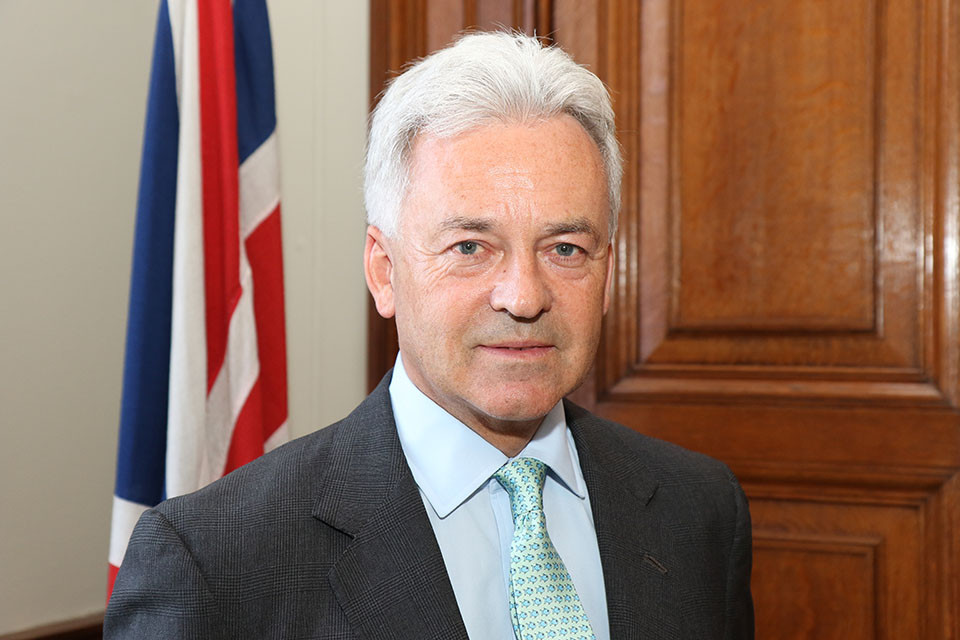We fully endorse the Secretary-General’s vision for an inclusive approach to conflict prevention, peace and development
Statement by Sir Alan Duncan MP, Minister of State at the Foreign and Commonwealth Office, at the Security Council Open Debate on International Peace and Security.

Well thank you Madam President.
And it gives me enormous pleasure to be able to sit here on behalf of the UK, and extend a warm welcome to you, Antonio, as the new Secretary-General.
On a very personal level I recall the work that we did together when you were the UN High Commissioner for Refugees and I was the UK Minister for International Development. And I’m glad that such cooperation can continue in both our new roles. I hope that the UK’s generous aid budget, much of which used to go in your direction, will not be forgotten!
You assume your role, sir, at a time of widespread instability and the existence of far too many long running conflicts across the world. The UK firmly believes in the role of the UN in upholding the fundamental principles of a rules-based international order, which must underpin our understanding of what is right and what is wrong in the world.
And Minister, may I thank Sweden for calling today’s debate. You and I have also worked together in the past when you were SRSG for Sexual Violence in Conflict, and I salute your continuing efforts to place conflict prevention and gender at the centre of your foreign policy.
Ever since the UN’s inception, the UK has been at the forefront of decisive UN action to prevent conflict. On this very day, 71 years ago, London played host to the first meeting of the UN General Assembly. And on the agenda in 1946 were two issues that still face us today – sustaining peace and supporting refugees driven from their homes by the scourge of war.
Both 7 decades ago and today, the UN’s work on these issues, and of course many more, remains fundamentally about addressing conflict. But we should recognise that while the issues may seem the same seven decades on, the UN’s response certainly is not. Because we have tools at our disposal that our predecessors never had; we’ve got tools for conflict prevention, mitigation, mediation, stabilisation and recovery. And so the challenge now is how to use these tools effectively, and often many of them at the same time.
And so we therefore fully endorse the Secretary-General’s vision for an inclusive approach to conflict prevention, peace and development - the “Peace Continuum” - and his commitment to achieve the reforms needed to deliver it.
The UK sees 5 key building blocks in the realisation of this vision.
First there’s development. We share the Secretary-General’s view that development is fundamental to addressing the drivers of conflict. And that’s why our own aid budget is increasingly focused on the world’s most fragile places. And the New Deal for Engagement in Fragile States laid the foundations for achieving the UN Global Goals. So together, we now must build on those foundations, and harness the UN’s political and security tools.
And secondly we need to equip ourselves with the expertise needed to take action sooner. And two obvious steps are improving situational awareness, which is building on New Zealand’s recent work; and supporting senior UN officials when they flag up risks and challenge the Council to respond. And the recent briefing on South Sudan by UN Special Representative Adama Dieng is an excellent example.
Thirdly, recommitting to make greater use of chapter VI of the Charter including enabling the Secretary-General to make full use of the tools at his disposal, such as his own good offices and expert mediation by his envoys and others.
And fourthly, we need to encourage regional responsibility. Because, try as we might to seek solutions from here in New York, the best ones are often found at the local level. So we should continue to support regional organisations who show leadership in preventing conflict. And this includes organisations that span multiple regions. For example, this year the Commonwealth has dedicated Commonwealth Day, and the ensuing year, to peace building, with a focus on practical action among its 52 member states.
And finally, we must ensure that UN deployments are fit for purpose. And that means that they must be properly prepared and equipped, with each mission tailored to the task at hand. It means the Council must be prepared to focus its resources in order to deliver these effective missions. And it means that we must deliver what we’re calling “the 3Ps”, as agreed at the Peacekeeping Defence Ministerial in London last September: better mission planning, more pledges of personnel and equipment, and improved performance.
So, if I conclude, the UN’s tools provide the best means to prevent conflict and lay the foundations for sustained peace. But we must deploy the right tools at the right time. And in many cases that means we should deploy them sooner: warning rather than reacting; mediating rather than peacekeeping. And that’s why the “Peace Continuum” is so important: it requires us to develop greater awareness of possible flashpoints so that we can chart a more peaceful course. So we agree with the Secretary General that if this great organisation is to continue to achieve its objectives, it must be simpler, more decentralised and more flexible.
So I am confident that between us and the Secretariat and the Member States that we have the knowledge, and the skills and the will to make it happen. And today can I reiterate the pledge of the United Kingdom that we will fully support that effort, just as we did 71 years ago.
Thank you sir and we wish you well.